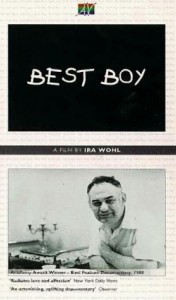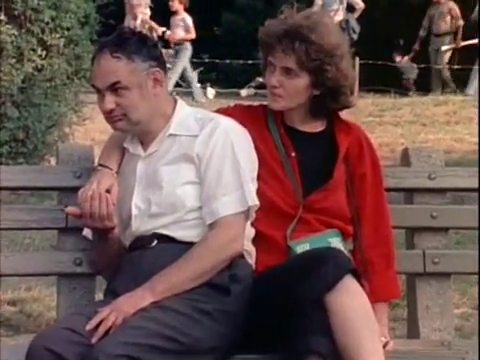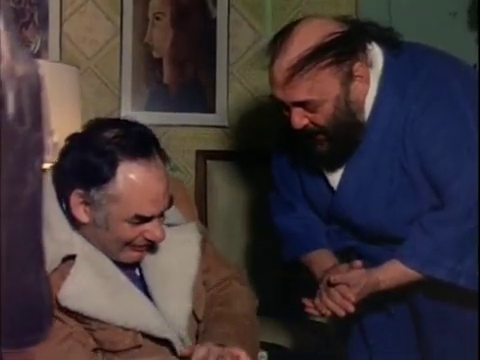“At age 52, Philly began to go to school.”
|

Synopsis:
Filmmaker Ira Wohl helps his aging aunt and uncle find a secure home for their intellectually disabled 52-year-old son, Philly.
|
|
Genres, Themes, Actors, and Directors:
- Documentary
- Grown Children
- Intellectually Disabled
- Survival
Response to Peary’s Review:
Peary writes that this “glowing documentary” — full of “many moving scenes” — is unique in that its director “openly influences the lives of the people he’s filming”. Due to Wohl’s concerns that “Philly will be defenseless if his elderly parents die, Wohl convinces them to allow Philly to take giant strides toward self-sufficiency” — and “the excitement that he feels as he progressively achieves independence is contagious.” As Peary notes, “the intimacy Wohl achieves is remarkable — we become extremely fond of Philly, but we also become sensitive toward his mother and (dying) father, who, when they don’t worry, are happy about their son’s accomplishments, yet understandably feel self-pity because the boy needs them less and less.” Wohl followed this film nearly twenty years later with a sequel, Best Man (1997), which is also of interest, though not nearly as poignant.
Redeeming Qualities:
- Wohl’s touching concern and love for his intellectually disabled cousin


- Watching Philly go to school for the first time

- Philly and Zero Mostel singing a backstage version of “If I Were a Rich Man” together

Must See?
Yes. This Oscar-winning documentary should be seen by all film fanatics.
Categories
Links:
|
One thought on “Best Boy (1979)”
First viewing.
A once-must, as a documentary which deserved its Oscar win.
What stands out as most refreshing about this film is the rather apparent presence of love between filmmaker and subject (Phil) – as well as subject and those closest to him. ~all of which makes for compelling viewing.
This is not the kind of doc that one thinks to critique necessarily; it’s just very much worth the time of any viewer (ff or not) who sits to watch it.
The one thing I did think of – though I don’t think it’s covered in the film – is the various levels of mental retardation, and what was it about Phil that allowed him to progress as much as he did (whereas that would not have been the case with others)?
One can’t deny the sense of melancholy that’s mixed with the generally uplifting view we are shown, overall. At one point, the mother makes a statement to the effect that having a mentally retarded child is a form of God’s punishment…which is a rather unfortunate frame of mind to be in. Punishment for what?
But, clearly, there is quite a bit of affection on display here, spread out in just about every interaction between two individuals at any given time. It’s especially heartwarming to see Zero Mostel talking with Phil backstage after a performance of ‘Fiddler on the Roof’.
This is a rewarding & enriching film experience.